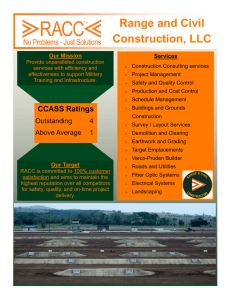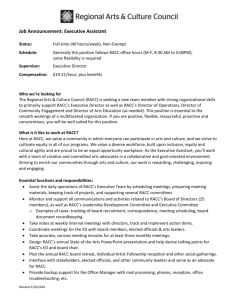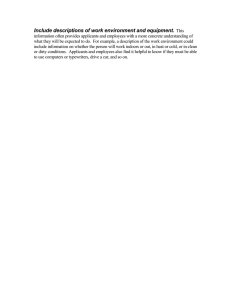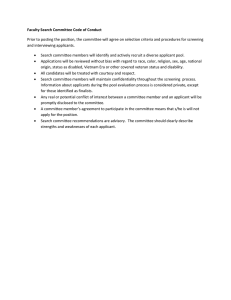Professional Development Grant Guidelines
advertisement
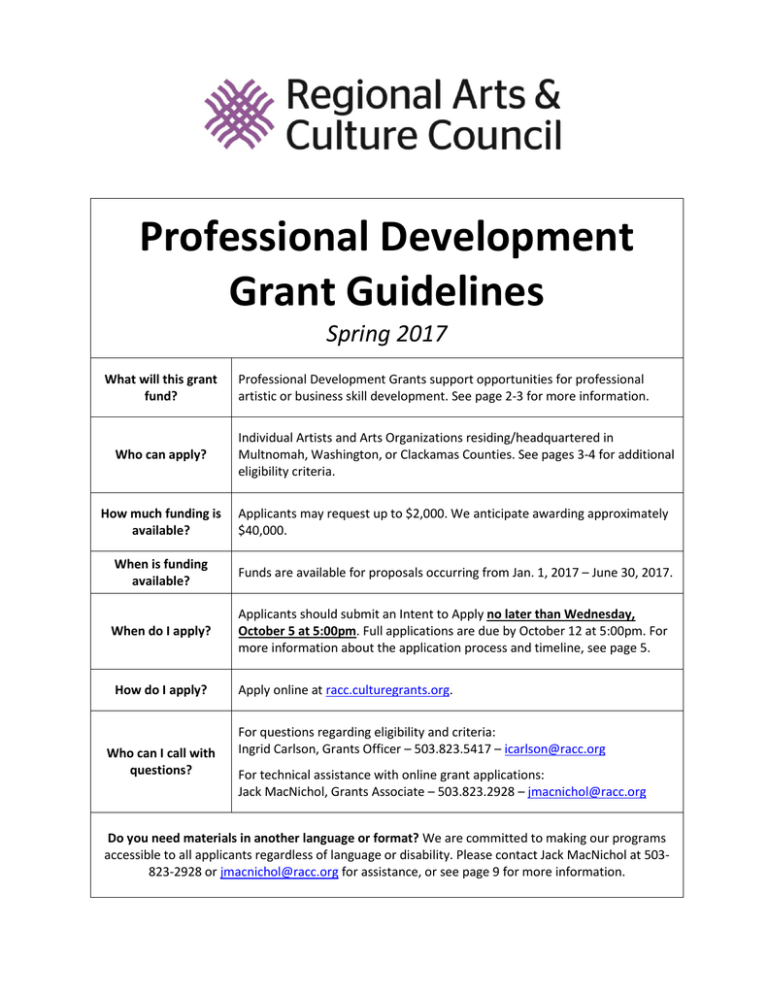
Professional Development Grant Guidelines Spring 2017 What will this grant fund? Professional Development Grants support opportunities for professional artistic or business skill development. See page 2-3 for more information. Who can apply? Individual Artists and Arts Organizations residing/headquartered in Multnomah, Washington, or Clackamas Counties. See pages 3-4 for additional eligibility criteria. How much funding is available? Applicants may request up to $2,000. We anticipate awarding approximately $40,000. When is funding available? Funds are available for proposals occurring from Jan. 1, 2017 – June 30, 2017. When do I apply? Applicants should submit an Intent to Apply no later than Wednesday, October 5 at 5:00pm. Full applications are due by October 12 at 5:00pm. For more information about the application process and timeline, see page 5. How do I apply? Apply online at racc.culturegrants.org. Who can I call with questions? For questions regarding eligibility and criteria: Ingrid Carlson, Grants Officer – 503.823.5417 – icarlson@racc.org For technical assistance with online grant applications: Jack MacNichol, Grants Associate – 503.823.2928 – jmacnichol@racc.org Do you need materials in another language or format? We are committed to making our programs accessible to all applicants regardless of language or disability. Please contact Jack MacNichol at 503823-2928 or jmacnichol@racc.org for assistance, or see page 9 for more information. INTRODUCTION The Professional Development Grant Program assists artists or representatives of arts organizations with opportunities that specifically improve their business management skills and/or help advance the careers of the individual artist or the arts administrator by supporting expenses related to specific, unique opportunities that have potential to significantly impact an individual’s work and professional development. An opportunity may be one of many things, but it must clearly demonstrate how the proposal will benefit the organization or individual long-term - see below for examples. Unlike grant programs that support the creation of new work, this program does not ask panelists to critique the applicant’s previous work. Instead, reviewers must determine from the application: Whether the applicant has made the case that this opportunity is timely and has true potential to positively impact their career or organization. Whether the opportunity is unique, and not a repetition of the applicant’s similar, previous experiences. An applicant may request any amount up to $2,000 and the maximum award in any one grant cycle is $2,000. Due to the competitive nature of this grant program, funded applicants may receive less than the requested amount. GRANT CYCLE This grant cycle for Professional Development Grants includes the period between January 1, 2017 through June 30, 2017. Activities must take place within this grant cycle. No extensions will be given. If the grant cannot be completed in this timeframe, the applicant will be required to relinquish the grant and apply in the next grant cycle if they choose to do so. EXAMPLES OF PROFESSIONAL DEVELOPMENT PROPOSALS 1. Travel and/or registration expenses for workshops, seminars, bookings, and other conferences which will clearly help in advancing the artist’s or organization’s development and are uniquely relevant to the artist’s or organization’s current stage of development. 2. An invitation to: exhibit at a prestigious gallery outside the Portland area; present at a major performing arts festival; study with a mentor or renowned teacher. It might be juried in some way or available only through a competitive selection process. In any case, it should not duplicate experiences the artist has had in the course of his/her ongoing work, and it must lead to professional growth in the artist’s career in a clear and meaningful way. 3. Artistic research for long-term benefit to the applicant. Research should not be “projectbased”, but related to the artist’s ongoing exploration and development of skills. 2 4. General promotional material including the development of websites. Promotional materials cannot be related to a specific project or season. Applicants must demonstrate a clear distribution and/or marketing plan in proposals for portfolio or promotional materials. 5. Consulting fees for professional consultants. ELIGIBILITY WHO IS ELIGIBLE TO APPLY? To be eligible for a Professional Development Grant, the applicant must: 1. Be an individual artist or a “not-for-profit” arts organization. IRS 501(c)(3) status is not required.* Definition: For the purpose of the Professional Development Grants Program, the definition of an “arts organization” is an organization whose primary mission and goals articulate its commitment to developing and providing on-going arts programs for the public. *Organizations wishing to apply need not be incorporated, formally recognized by the IRS as a public charity (i.e., under 501(c)(3) of the Internal Revenue Code), or otherwise officially established as tax-exempt institutions. However, it must be “not-for-profit,” in that the organization’s net earnings are not distributed to those who control it, and have an Federal Employer Identification Number (FEIN) 2. Be applying for an opportunity that specifically benefits the business management of the artist or organization and its staff; or brings the artist or organization to another level artistically. 3. Be headquartered/physically reside with a legal residence within RACC’s service area which includes Multnomah, Washington and Clackamas Counties. If awarded a Professional Development grant, the grantee must continue to be headquartered/physically reside within the Tri-County area for the duration of the grant. Otherwise, the grant will be forfeited. Legal address as shown on income tax return must be within RACC’s service area. (Applicants must be able to offer physical proof of residence upon request.) 4. Have completed reporting requirements due for previously funded RACC grants. 5. Artists who have a history of working together may submit a proposal to support expenses related to an opportunity presented to them as collaborators. Only one artist will submit the application, but the answers to the narrative questions should address the nature of the collaboration. INELIGIBLE PROPOSALS OR APPLICANTS 1. Grants will not be awarded to an individual to learn a new craft or for degree or certificate program tuition. 2. Grants will not be awarded to pay for a full or part-time staff position. 3 3. Grants will not be awarded to pay the applicant’s own professional artistic or administrative fees or expenses. 4. Grants will not be awarded for similar activities in consecutive years. 5. Individuals enrolled in a degree or certificate program in the arts at the time of application are not eligible to apply. 6. Professional Development Grants cannot be project focused. 7. Professional Development Grants cannot be related to a RACC Project Grant Proposal. 8. Applications that are incomplete, or do not follow application requirements, may be deemed ineligible and returned to applicant 9. RACC General Operating Support organizations are not eligible to apply. However, individual artists who work for General Operating Support organizations may apply provided the Professional Development opportunity is related to their career as an individual artist and not related to the work they do for the organization. 10. Applicants that have received a Professional Development Grant from RACC may not apply for one cycle following their recent award. 11. Members of RACC staff or board are not eligible to apply. 12. Additional Ineligible Expenses: Professional Development Funds may not be used for creation of new works of art, curatorial projects, activities that have already taken place, ongoing work or business expenses, undergraduate or graduate study, purchase of food, purchase of equipment costing more than $500 or equipment not related to a specific, imminent opportunity, teaching opportunities, self-produced publications, medical fees and most legal or accounting fees. EXAMPLES OF ELIGIBLE EXPENDITURES 1. Travel and other costs associated with an imminent, concrete opportunity to perform, exhibit or audition, or for a unique opportunity to study with a significant mentor. 2. Reasonably-priced accommodations if opportunity is more than a 100 miles from home. 3. Professional fees and services related to a specific opportunity. FUNDING RESTRICTIONS 1. Available funding from Multnomah, Washington, and Clackamas County governments will influence awards to applicants in those counties. 2. Whenever possible, RACC strives to award applicants who have not benefited from Professional Development grants in recent prior cycles. 3. Arts organizations must provide RACC with a Federal Employer Identification Number in the application. (If you have questions about FEIN’s, contact RACC staff.). 4. Individual artists must provide RACC with a Social Security number or Individual Tax Identification number upon notification that you have been awarded a Professional Development Grant. 4 APPLICATION PROCESS Preparing to apply: All application materials must be submitted online. Applicants should create an account, or log into their existing account, in RACC’s online grant system at racc.culturegrants.org to apply. Important notices are sent through the system and we recommend applicants add noreply@culturegrants.org to their address book to ensure these messages are delivered. Intent to Apply: All applicants must submit an Intent to Apply form via GrantsOnline by Wednesday, October 5, 2016 by 5:00pm. Applicants who do not submit an Intent to Apply by this deadline, will not be able to submit an application. Please make sure to click the submit button on the final page of the Intent to Apply. Applicants will receive a confirmation email when their intent has been successfully submitted. Intent to Apply Review: RACC staff will review all Intents to Apply to ensure applicants meet the eligibility criteria listed on pages 3-4 of these guidelines within 2 business days. Applicants will be notified by email when their Intent to Apply has been approved and will have access to the full application on the Dashboard page in their GrantsOnline account. Staff will contact applicants if there are concerns regarding eligibility. Full Application: All applicants must submit their complete application including all supplemental material via GrantsOnline by Wednesday, October 12, 2016 by 5:00pm. Late online applications will not be accepted. Changes to the application cannot be made once it has been finalized and submitted. Please make sure to click the submit button on the final page of the application. Applicants will receive a confirmation email when their application has been successfully submitted. Supplemental Material Requirements All applicants must also submit supplementary materials with their application. These files need to be uploaded via GrantsOnline. Please label files clearly. GrantsOnline will accept a variety of file types including .pdf, .doc, .docx, .jpg, .tiff, .mp3, .mp4, and .mov. Organization applicants must submit: 1. Resumes or bios of all artists, staff, and consultant(s) involved. 2. History of organization. (Include brief narrative, mission statement, key programs, date established, 501(c)(3) status, number of paid staff, number of volunteers, number of board members.) 5 3. Information relevant to the activity or event outlined in the proposal, such as letter(s) of invitation, brochures, consultant’s worksamples if available, and/or any other applicable materials. 4. Quotes to support the proposed budget. Individual applicants must submit: 1. Resume of applicant and resumes or bios of any consultant(s). 2. Information relevant to the activity or event outlined in the proposal, such as letter(s) of invitation, brochures, consultant’s worksamples if available, and/or any other applicable materials. 3. Quotes to support the proposed budget. IMPORTANT: RACC Grants Staff is here to provide technical help! Please contact us as soon as possible if you need access to a computer, have questions about uploads, or need assistance submitting your application in the GrantsOnline system. For assistance contact Jack MacNichol at 503-823-2928 or jmacnichol@racc.org. GRANTWRITING TIPS! As an applicant, you need to communicate clearly: WHO you will be working with and why they are the best choice for you or the organization. WHAT the impact will be on your career/organization and why this is the best way to achieve those results. WHY the opportunity is appropriate at this time or whether the opportunity is time-bound in some way. HOW the opportunity is unique and what this opportunity offers that isn’t otherwise available to you. WHERE the applicant is contributing in the budget (either in-kind or cash) towards the proposed activity. 6 APPLICATION REVIEW Review Criteria When crafting your responses to the narrative items, please keep the Professional Development Review Criteria in mind. A panel will apply the following criteria in the review of applications: Proposal Merit 1. 2. 3. 4. High quality of proposed activity. High quality of professionals involved. Uniqueness of activity to the applicant. Capacity to meet proposal objectives. Benefit to Applicant 1. Documentation that proposal will improve business/management skills and/or artistic growth. 2. Evidence that proposal will help to develop the artist or organization. Application/Budget Preparation 1. 2. 3. 4. 5. Clear description of project and other required information. Realistic projections of proposal’s budget. Accuracy and completeness of budget. Complete set of supplementary materials submitted by the deadline. History of non-compliance with previous RACC grant requirements. Review Process 1. RACC staff will review proposals to determine basic eligibility. Applicants will be notified by email if their proposals are deemed ineligible. 2. A panel of RACC staff will review and rate proposals according to established criteria. 3. In addition to rating the applications, the panel will determine if an applicant will be recommended for a grant. Panel recommendations will be based on Proposal Merit, Benefit to the Applicant, and Application/Budget Preparation. Please see Review Criteria. 4. Award amounts will be based on panel ratings and recommendations. 5. The Professional Development Grant review panel’s final recommendations for grant awards will be presented to the Grants Review Committee (GRC), and then on to the RACC Board of Directors for final approval. 6. Grant applicants can anticipate notification of grant award status on approximately December 19, 2016. 7 GRANT AWARDS & ADMINISTRATION The amount of the Professional Development Grants will depend on the funds available in the RACC Professional Development Grant budget for the year. The RACC Board may, at its discretion, place limits on the amount it will award in any one grant. Awards will not exceed $2,000. Adjustment of proposal may be necessary and permitted, if an application is not fully funded. A grantee can receive up to half of their grant in advance by submitting an invoice via the GrantsOnline system after January 4, 2017. The final balance can only be received once the activity is completed and all Final Report/Evaluation Requirements are submitted to RACC. ACKNOWLEDGMENT (CREDIT TO RACC) Professional Development Grant recipients will acknowledge the support by RACC in all printed or digital materials related to the Professional Development Grant, if applicable. The RACC logo shall be used if space and format permit. FINAL REPORT REQUIREMENTS At the close of the Professional Development Grant cycle, grant recipients will be required to submit a Final Report/Evaluation (accessed via RACC’s GrantsOnline system) and documentation of eligible expenses in order to receive final payment of their grant. Final Reports for this grant cycle will be due no later than August 15, 2017. RACC GRANT COMPLIANCE 1. History of non-compliance with previous grant requirements (such as evaluations or timely completion of past projects) will affect the grant award. 2. Applicants awarded a Professional Development Grant Cycle 2 must complete the grant between January 1, 2017 and June 30, 2017. 3. Final reporting requirements must be met within 45 days after the grant cycle has ended in order to be considered in compliance with grant guidelines. It is the responsibility of the grant applicant to notify RACC staff in writing and in advance of any changes in the grant status. 8 APPLICATION ASSISTANCE The RACC grants staff is available to support applicants throughout the grant process. Technical Assistance with GrantsOnline If you have any difficulty logging into or submitting your application through GrantsOnline, please contact Jack MacNichol at 503-823-2928 or jmacnichol@racc.org. Translations Services and Accommodations We are happy to provide accommodations for people with disabilities and those who need English language translation support at any point in the process. Please contact Jack MacNichol at 503-823-2928 or jmacnichol@racc.org to request accommodation, translation, or other assistance. Grant Orientations Grants staff will offer a free, optional orientation session for potential applicants to learn more about the process and answer questions. The orientation will be held on Saturday, September 17, from 2-3:30pm at the RACC Office. Please RSVP to jmacnichol@racc.org if you would like to reserve a space! Grant Draft Review RACC Grants Officers are happy to read draft applications and provide feedback. This service is provided on a first come-first served basis. Please complete and save your draft in the GrantsOnline system and do not submit. Notify Ingrid Carlson (icarlson@racc.org) that your draft is ready for review. We will review the draft you have saved in the system and schedule a time to provide feedback over the phone. In order to accommodate as many applicants as possible, please have your draft ready, including the budget, no later than Thursday, October 6 at 5:00pm. Staff will not be able to accommodate feedback requests after this date. If you have questions during the application process, please contact the following staff: Technical Support – Jack MacNichol, Grants Associate – 503.823.2928 – jmacnichol@racc.org Criteria and Eligibility – Ingrid Carlson, Grants Officer – 503.823.5417 – icarlson@racc.org 9 ABOUT THE REGIONAL ARTS & CULTURE COUNCIL RACC MISSION STATEMENT To enrich our communities through arts and culture. RACC VISION STATEMENT An environment in which arts and culture flourish and prosper. STATEMENT OF NON-DISCRIMINATION OF BOARD MEMBERSHIP, EMPLOYEES & CLIENT SERVICES The Regional Arts & Culture Council is committed to building a community in which everyone has equitable access to arts and culture. RACC values diversity, equity and inclusion, and strives to cultivate Board members and employees, as well as provide client services that reflect and represent our region. RACC maintains a policy of electing individuals to the Board of Directors who reflect the diverse makeup of our communities in terms of professional expertise as well as personal dimensions such as, but not limited to, race, ethnicity, age, gender, sexual identity, disability and socioeconomic background. The Regional Arts & Culture Council is committed to providing services and making resources available to every member of the tri-county, Portland-metropolitan area. We prohibit discrimination against our constituents, employees and applicants for funding or employment on the basis of real or perceived national origin, race, color, age, marital or familial status, sex, sexual orientation, gender identity, gender expression, educational background, disability, religion, political opinion, physical appearance or veteran status. AMERICANS WITH DISABILITIES ACT CERTIFICATION/STATEMENT OF NONDISCRIMINATION By submitting an application, the applicant agrees to comply in every way with all applicable entity or individual receiving grant provisions of the Americans with Disabilities Act of 1990, 42 USC Sec. 12101, et seq. and agrees not to discriminate on the basis of race, creed, religion, color, sex, marital status, political opinion, familial status, national origin, age, gender, mental or physical disability, sexual orientation, military status, gender identity and source of income or disability status. 10
